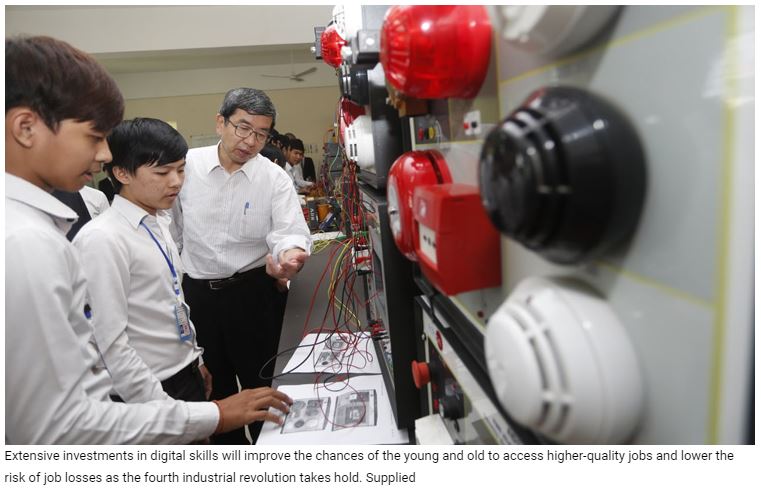Cambodia: Industry 4.0 impact will transform skills and jobs, says ADB
A new study by the Asian Development Bank (ADB) suggests that Cambodia should consider developing industry transformation maps in key sectors and plan for adequate investment in skills development for new and repositioned jobs in order to enable the Kingdom’s transition to the fourth industrial revolution (4IR).
The finding is one of six key recommendations emerging from ADB’s Reaping the Benefits of Industry 4.0 through Skills Development in Cambodia study. It is part of a four-country study of ASEAN nations that also includes Indonesia, the Philippines and Vietnam.
The study examines the garment and tourism industries in Cambodia, both of which are important in the nation’s growth, employment, international competitiveness and transition to a 4IR-driven economy.
The study found that 4IR technologies will eliminate jobs in the garments and tourism industries, but these losses would be offset by an increase in demand arising from higher productivity. That could potentially generate net job increases of 39 percent in the garments sector and 2 percent in tourism employment.
While the government and industry are keen to promote 4IR skills, employer surveys in the two industries reveal a limited understanding of the associated technologies. Only 28 percent of the garment manufacturers and 35 percent of the tourism employers surveyed agreed or strongly agreed when asked whether they had a good understanding of 4IR technologies and their relevance to their companies.
The study found that employers in Cambodia displayed a much lower understanding of 4IR than those surveyed in Indonesia, the Philippines and Vietnam.
ADB Country Director for Cambodia Sunniya Durrani-Jamal said while 4IR could be transformative for jobs and skills in Cambodia, it will be necessary to address its potentially disproportionate impact on women. “We must improve knowledge of 4IR technologies and their benefits, support enterprises in their adoption of advanced technologies and offer support for re-training and reskilling programmes… to ensure no one is left behind,” said Durrani-Jamal.
Despite the overall positive net employment effect in both industries, the study warns there is no guarantee that displaced workers can seamlessly move into newly created jobs without adequate and timely investments in skills development. The study showed job displacement will disproportionately affect women, who make up around 81 percent of Cambodia’s garment manufacturing industry. It calls for Cambodia to develop technical and vocational education and training programmes, with dedicated 4IR credentials in garment manufacturing and tourism as well as flexible and modular skills certification programmes that recognise skills attainment outside traditional education channels. The study also recommends the implementation of incentive schemes for firms to train their employees in 4IR that could be led by the Cambodia Skills Development Fund. In tourism, policymakers are urged to leverage growth of app developers to build 4IR readiness to ensure training in communication and social skills and to foster stronger coordination between training institutions and employers.
Ninety percent of garment manufacturing employers surveyed and 79 percent of tourism employers reported that graduates hired in the past year were not adequately prepared for entry-level positions. This contrasts with the perception of training institutions, almost 60 percent of which stated their graduates were adequately prepared.
ADB Principal Education Specialist Shanti Jagannathan said as 4IR technologies spread rapidly, extensive investments in digital skills will improve the chances of the young and old to access higher quality jobs and lower the risk of job losses. “Now is the time to re-think the delivery of skills using virtual platforms and mobile technologies to
develop agile training institutions with courses and credentials that match market needs,” she added.
The Royal University of Phnom Penh (RUPP) initiated a direct path to the nation’s eventual embrace of the Fourth Industrial Revolution by offering a new online course entitled Digitalised Manufacturing for Industry 4.0. It was undertaken in cooperation with DMG MORI, the Japanese-German manufacturer of advanced technologies and automation and digitalisation solutions, as well as with the support of the Japanese government. That course will commence next month at the RUPP campus.
Source: https://www.khmertimeskh.com/50805649/industry-4-0-impact-will-transform-skills-and-jobs-says-adb/


 English
English




